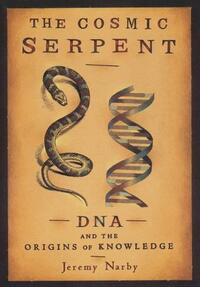Take a photo of a barcode or cover
I would have been more comfortable with this if Narby had a PhD in biology. Since he has a PhD in anthropology instead, I'm a little weary of his conclusions. The connections he draws seem to be the consequence of extreme confirmation bias. Although he acknowledges that he largely deemphasizes Western ideology in order to tune into the essence of shamanism, it rather appears like he's ignoring all evidence that refutes his theory. The idea itself is beautiful. I could believe it if he provided me with a tad bit more of molecular or neurobiology to bolster his argument about plant communication with human DNA (through photons). I think the subject matter Narby became involved with surpasses him. He attempts to explain that science isn't everything, and yet, he ventures to find a way to prove his theory through the use of experimental data. It is clear that the author was deeply moved by his experience with DMT, and his visions propelled him to write the book. According to behavioral neurologist V.S. Ramachandran, spiritual experience arises from an amplified connection between the right temporal lobe an the amygdala. This strengthened neural pathway causes all or most events to seem connected and meaningful. I sense that DMT had a similar effect on Narby's brain.
An interesting dive into the shamanistic traditions of indigenous tribes, and how they use psychedelics to access information about their surroundings. Though I loved the first half, I felt that the second half strayed a little too much into paranormal / alt-science presuppositions. Regardless, a fascinating read.
challenging
slow-paced
I'm fascinated, but not convinced by some of the claims and arguments. I'd be interested to see an update given developments in molecular biology since this book appeared. But, quite compelling all the same.
adventurous
informative
mysterious
reflective
fast-paced
While Narby's central ideas are intriguing, this felt very long-winded, and presented relatively few actual arguments as compared to the number of pages, and very few compelling arguments beyond 'well these things resemble each other'
An interesting read and a nice change in pace from the non-fiction I usually read.
Was interesting to some extent in hearing anthropological take with the more complicated aspects in biology. Sadly, the author didn't take as much time learning the aspects of biology he was looking at as much as he did the tribes and their traditions and beliefs. Even with the understanding that this was written before many new understandings came to be in genetics and microbiology. Author didn't consider that other elements and conditions will limit what we have access to learning and knowing before a particular point in time.
Such an interesting and eye-opening book that truly made me reconsider Western molecular biology in relationship to Amazonian beliefs. Would definitely recommend.
informative
reflective
medium-paced






